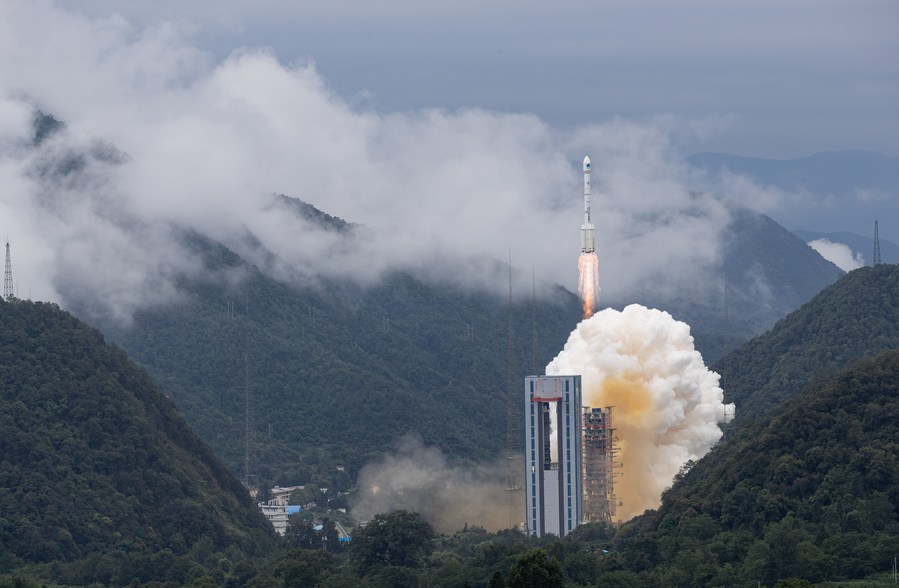How BeiDou builds its 'circle of friends'
China has always ensured its BeiDou Navigation Satellite System is open to the world, striving to foster win-win cooperation with more and more countries in space-based navigation and positioning.
As a satellite navigation system is a public infrastructure belonging to the world, China has always ensured its BeiDou Navigation Satellite System (BDS) is open to the world.
Members of ASEAN, countries in South Asia, Eastern Europe, West Asia and Africa have successively joined BeiDou's "circle of friends," sharing achievements and promoting mutual cooperation in the area of satellite navigation systems.

A carrier rocket carrying the last satellite of the BeiDou Navigation Satellite System (BDS) blasts off from the Xichang Satellite Launch Center in southwest China's Sichuan province, June 23, 2020. [Photo/Xinhua]
BeiDou ambition: Win-win cooperation
It is China's consistent position to make peaceful use of space and conduct in-depth international cooperation and exchanges there.
As a core supplier of the Global Navigation Satellite System (GNSS), the BDS system has injected new thinking, new concepts and new impetus into the development of global navigation system.
After the completion and official launch of the BDS-3 system, the United Nations Office for Outer Space Affairs (UNOOSA) issued a congratulatory video acknowledging the great contribution of BDS to global socioeconomic development, peaceful use of outer space and its engagement in U.N. international space cooperation.
The BDS system has also offered joint R&D results, industrial cooperation as well as education and training opportunities among higher learning and scientific research institutions of the world.
The satellite navigation experience BeiDou has accumulated offers a short cut for other countries to develop their own satellite navigation systems. For instance, as the first overseas center of BDS, the China-Arab States BDS/GNSS Center has not only cultivated a large number of international talents, but also actively participated in the construction of regional cooperation mechanisms such as the China-Arab States Cooperation Forum, sparing no effort to contribute Chinese wisdom and solutions to the world.
BeiDou responsibility: Benefiting mankind
It is the bounden duty of BeiDou to safeguard peace and security for all humanity and to underpin the development of the global society.
In recent years, with the better services provided, the BDS system has actively taken part in world affairs, fulfilled its international obligations and provided services to a number of international organizations.
It has also been recognized by the International Civil Aviation Organization (ICAO) as one of the four core constellations of GNSS.
The first international standard for mobile communication supporting the BDS-3's upgraded signals has been issued. The first BDS shipping terminal test standard also has been released to the world by the International Electrotechnical Commission (IEC).
The International Satellite System for Search and Rescue has recognized the BDS system as part of its global radio navigation system. Work is now underway on a standard document and accession test of BDS-3 in regard to maritime search and rescue.
The BDS system is sure to play an increasingly important role in contributing to the wellbeing of humanity and the building of a community with a shared future for all.
BeiDou: A world-renowned brand
The BDS system is actively responding to the Belt and Road initiative and is providing the customized services needed by various industries of different countries, thus gradually becoming a world-renowned brand.
In 2013, the use of more than 500 high-precision BeiDou terminals in Myanmar indicated the first large-scale application of BeiDou high-precision products in agricultural data collection and land precision management in Southeast Asia.
In 2015, the BDS-based high-precision receiver was applied to the construction of the 300-meter headquarter building of the National Bank of Kuwait, ensuring the vertical measurement error was held at the millimeter level during the building process. This was the first time that BeiDou had been used for monitoring high-rise building construction overseas.
In 2018, the BDS system contributed to the offshore pile-driving project in Heritance Aarah, Maldives by providing all-weather and high-precision services, realizing intelligent monitoring, visual operations and high-precision construction of offshore piling.
The BDS system has also been applied in Singapore, Cambodia, Laos, Russia and many parts of Europe to facilitate high-precision and high-speed piling, provide high-precision government services, support cadastral survey and land management, ensure the safety of transmission and distribution lines and the stability of power systems, and track the trains in real time to facilitate logistics development.
In addition, Indonesia, Malaysia and Thailand are among others actively utilizing the BDS system to explore the development of smart cities. So far, the basic products based on BeiDou have been exported to more than 120 countries and regions and have been successfully applied in ASEAN, South Asia, Eastern Europe, West Asia, Africa and so on.
Content created in partnership with Science and Technology Daily.

